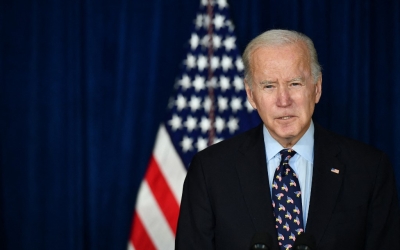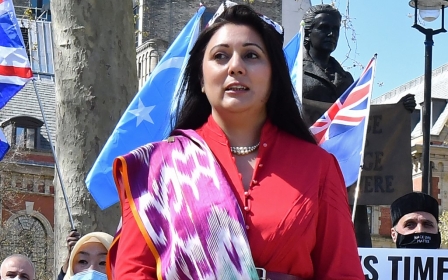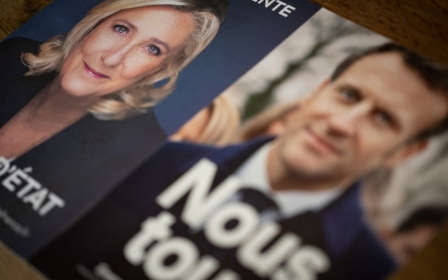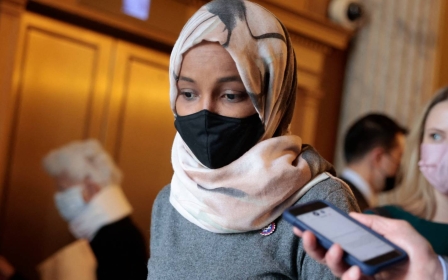US Roe v Wade debate brings up age-old Islamophobic tropes
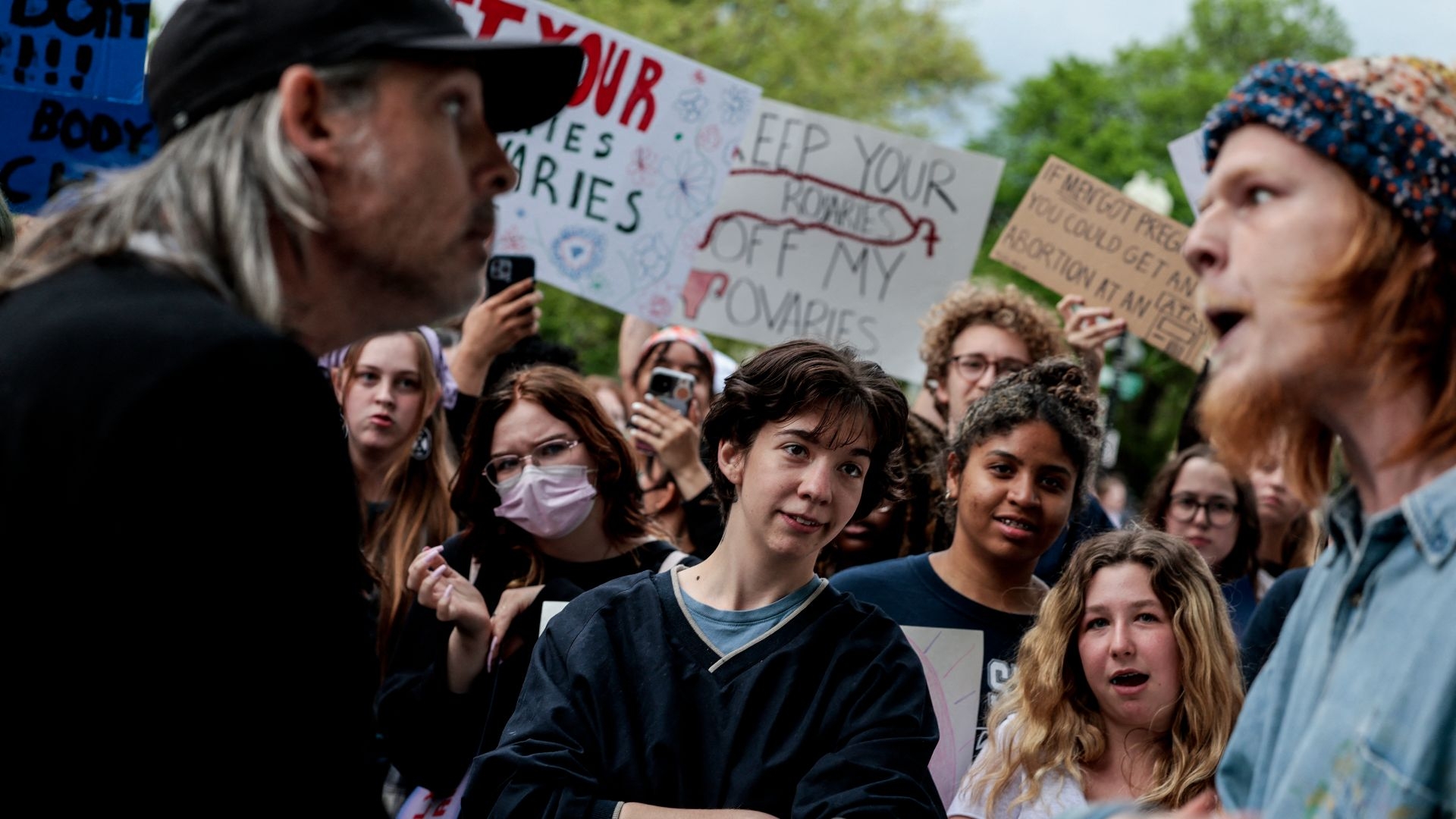
On Monday, an initial draft opinion leaked by Politico suggested that the US Supreme Court could soon overturn the decades-old Roe v Wade ruling, a move that would have a monumental impact on reproductive rights in the US.
What followed was a slew of outrage on social media, news articles, and opinion pieces. But within that backlash, a repetitive, racist and Islamophobic trope reemerged.
In castigating the Supreme Court justices who wrote the draft ruling, many equated the potential impact with being placed under "sharia law" or under the rule of the "American Taliban".
In other words, the decision to ban abortions, a cause championed by Christian conservatives and fundamentalists in the US, was equivalent to living under an "extremist" Muslim government.
'It makes Muslims and our ways of thinking, being and understanding the world akin to the boogeyman'
- Muna Saleh, Concordia University of Edmonton
The comparison was met with immediate condemnation by many Muslim Americans as well as academics. They argued that this was just another example of Muslims being used as a scapegoat to demonise Muslims and when discussing structural issues in the US.
New MEE newsletter: Jerusalem Dispatch
Sign up to get the latest insights and analysis on Israel-Palestine, alongside Turkey Unpacked and other MEE newsletters
"This is a form of Islamophobia because you don't need to be bringing us into this right now, but you are choosing to in order to underscore how awful and messed up [the draft decision] is," Muna Saleh, an assistant professor at the Concordia University of Edmonton, who has studied Islamophobia, told Middle East Eye.
"It reinscribes Islamophobist ideas and notions and stereotypes. What it does is that it positions Muslims and our belief systems and our traditions as inherently the opposite of what 'civilised' means."
Roe v Wade is a 1973 decision by the Supreme Court which determined that the right to an abortion is protected under the US constitution.
According to the 98-page draft obtained by Politico, Justice Samuel Alito, the author of the document, wrote that "Roe was egregiously wrong from the start," before stating that the decision on whether or not to ban abortion should be obtained by individual states.
According to a Washington Post-ABC News poll conducted late last month, 54 percent of Americans think the Supreme Court should uphold the ruling, compared with 28 percent who said it should be overturned.
This isn't the first time these comparisons have been made. Just last September, headlines across American newspapers read "Texas Taliban" when the state introduced a ban on abortions after six weeks of pregnancy.
Even some Muslim pundits in the US have invoked Muslim terminology to describe the problems of Christian fundamentalism, working to erase decades of attempts from Muslim leaders, scholars and activists to reclaim those terms falsely equated with extremism in the post-9/11 era.
"It's just ridiculous to position Sharia in the conversation because it's literally a framework for how we live, not a 'law'. It makes Muslims and our ways of thinking, being, and understanding the world akin to the boogeyman," Saleh said.
Externalising America's internal problems
Abortion is an issue that is met with a spectrum of opinion in Islamic law, with different schools of thought offering different rulings. Judgements are also often decided situationally, with the mental and physical well-being of the mother being taken into consideration.
As Islam's myriad of views do not fall in line with the binary in US politics, experts say the use of the religion in the American debate shows how Muslims are continually seen as backwards and regressive.
"The Muslim piece is just a convenient scapegoat. It really represents the idea that, how can the United States ever have a regressive policy? We can only find that rooted in other religions and cultures and obviously Islam and Muslims are convenient when it comes to these issues," Maha Hilal, a researcher and writer on institutionalised Islamophobia, told MEE.
"They're basically saying we want to remind you that Muslims are regressive and oppressive and backwards, and we're not going to accept or take accountability or responsibility for the problems we have.
"To me, it represents a fundamental inability to comprehend that the United States is a regressive country on its own, and it does not need comparisons for that to be the conclusion."
Nazia Kazi, an associate professor at Stockton University who has written extensively on Islamophobia and race in the US, said that comparing the leaked draft of the Roe v Wade decision to something that is equal to being in a "repressive" Muslim country ultimately "reflects this assumption that Muslim women are uniquely oppressed and that American or western women are remarkably liberated".
"From both the American common sense public imagination, right on up to the seats of power, there's this impulse to externalise that which actually is endemic to the US itself," she told MEE.
The malleability of anti-Muslim racism
The experts said the comparisons are also an offshoot and adaptation of the more clear-cut racism and Islamophobia that existed after the 9/11 attacks and the subsequent "war on terror".
Then, the terminology "creeping sharia" was put forward for the purpose of fearmongering and generating hatred towards Muslims in the US and other western countries.
'The Muslim piece is just a convenient scapegoat. It really represents the idea that, how can the United States ever have a regressive policy?'
- Maha Hilal, writer and researcher
Now, as the US government has shifted the narrative of its "war on terror" framework to combat white nationalist extremism domestically, the large-scale campaign to root out the perceived notion of "Muslim extremism" appears to have come to an end.
But Saleh said this isn't the case, claiming that racism towards Muslims has shifted forms, while maintaining the idea that Islam is at odds with western values.
"Racism is very adaptable and malleable. And it shows up in these different ways. So right now it's not going to show up by saying I hate Muslims or I don't like Muslims, especially for liberals," said Saleh.
"It's gonna show up through the signposts that are much harder to decipher for a lot of people, and much harder to recognise."
Kazi added that the shift away from the two-decade-long global war on terror "does not mean a rolling back of the racial politics that were ushered in by the war on terror, specifically Islamophobic racial politics. Those are alive and well.
"They are part of the American racial vocabulary at this time."
Middle East Eye delivers independent and unrivalled coverage and analysis of the Middle East, North Africa and beyond. To learn more about republishing this content and the associated fees, please fill out this form. More about MEE can be found here.


